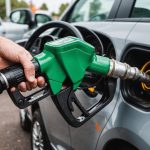In recent years, there has been a growing focus on fuel economy across the UK. With the increasing cost of gas and a societal push towards environmentally friendly driving practices, it’s essential to understand how we can enhance the fuel efficiency of our vehicles. Whether you belong to a fleet management team or are an individual car owner, understanding the key products and techniques that can help improve your mpg (miles per gallon) is crucial. This article explores the top UK vehicle products designed to optimize engine performance, tyre efficiency, and overall driving habits. By integrating these tools and practices, you can significantly boost your vehicle’s efficiency, reducing both costs and your carbon footprint.
Optimizing the Engine for Better Fuel Efficiency
The engine is the heart of any vehicle, and its performance is directly linked to fuel efficiency. Several products and strategies can help you optimize your engine’s performance and, in turn, enhance your mpg.
Have you seen this : What are the best practices for using UK vehicle degreasers effectively?
Engine Tuning and Chips
Modern cars are equipped with complex engine management systems that regulate performance. Engine tuning and performance chips can recalibrate these systems to achieve better fuel economy. These modifications adjust air-fuel ratio, ignition timing, and other parameters to ensure the engine runs more efficiently.
Synthetic Oil
Switching to high-quality synthetic oil can significantly reduce the friction in your engine, leading to improved efficiency. Synthetic oils provide better lubrication, last longer than conventional oils, and can handle extreme temperatures more effectively, ensuring your engine runs smoothly year-round.
Additional reading : What are the best UK vehicle products for keeping my dashboard clean and streak-free?
Air Filters
An often-overlooked component, the air filter, can dramatically impact your engine’s efficiency. A clean, high-performance air filter allows for optimal airflow into the engine, improving combustion and boosting mpg. Consider products like K&N or Green Filters, which are designed to enhance air intake efficiency.
By focusing on these engine optimizations, drivers can experience a notable increase in fuel efficiency, making their cars and fleets more economical.
The Role of Tyres in Fuel Efficiency
Tyres play a pivotal role in determining a vehicle’s overall fuel efficiency. Despite their importance, many drivers overlook tyre maintenance and choice when considering ways to improve mpg.
Choosing the Right Tyres
The type of tyre you choose can significantly affect your car’s fuel consumption. Efficient tyres, often branded as “eco” or “fuel-saving” tyres, are designed to minimize rolling resistance, which is the energy lost when a tyre rolls. Brands like Michelin Energy Saver or Bridgestone Ecopia are popular choices for those seeking to enhance fuel economy.
Regular Maintenance
Regular tyre maintenance is vital for maintaining optimal fuel efficiency. Ensuring your tyres are inflated to the correct pressure can prevent increased rolling resistance, which can negatively impact mpg. Under-inflated tyres require more energy to maintain speed, thus consuming more fuel.
Tyre Alignment
Proper tyre alignment ensures that all four tyres are working together efficiently. Misalignment can lead to uneven tyre wear and increased resistance, making your vehicle work harder and consume more fuel. Routine alignment checks can help you avoid these issues, contributing to overall fuel savings.
By investing in the right tyres and prioritizing regular maintenance, drivers can see a noticeable difference in fuel efficiency and economy.
Driving Habits: The Key to Efficient Fuel Usage
While products can certainly enhance fuel efficiency, driving habits play an equally crucial role. By adopting a few simple practices, you can maximize your vehicle’s efficiency.
Maintaining a Consistent Speed
Driving at a constant speed is one of the most effective ways to improve mpg. Frequent braking and accelerating consume more fuel than maintaining a steady mph. Utilize cruise control on highways to help maintain a consistent pace.
Smooth Acceleration and Braking
Rapid acceleration and harsh braking can significantly decrease fuel efficiency. Instead, accelerate smoothly and anticipate stops to brake gently. This driving technique not only saves fuel but also reduces wear and tear on the engine and brakes.
Reduce Idling
Idling can waste a significant amount of fuel over time. If you’re waiting for more than a minute, it’s more economical to turn off your engine and restart it when you’re ready to move. Modern cars are equipped with start-stop systems to help minimize idling time.
Lighten the Load
Excess weight in a vehicle requires more energy to move, thus using more fuel. Regularly remove unnecessary items from your car, and use a roof rack sparingly, as it can add drag and reduce fuel efficiency.
By incorporating these driving habits, you can substantially increase your vehicle’s fuel efficiency and reduce your overall consumption.
Technological Innovations in Fuel Efficiency
Advancements in technology continue to offer innovative solutions to improve fuel efficiency in vehicles. These innovations are particularly beneficial for fleet managers looking to enhance the performance of their entire fleet.
Hybrid and Electric Vehicles
Hybrid and electric vehicles represent a significant leap in fuel efficiency technology. While not solely reliant on traditional fuel, these cars use a combination of electricity and gas to optimize performance. Investing in a hybrid or electric vehicle can significantly reduce fuel consumption and environmental impact.
Telematics
Telematics systems provide real-time data on vehicle performance, including fuel usage, speed, and driving behavior. This information can help drivers and fleet managers identify areas for improvement, leading to better fuel economy. Brands like TomTom and Verizon Connect offer robust telematics solutions.
Lightweight Materials
The use of lightweight materials in vehicle manufacturing is an ongoing trend aimed at improving fuel efficiency. By reducing the overall weight of a vehicle, manufacturers can enhance mpg without compromising safety or performance. This is particularly beneficial for fleet vehicles that cover long distances.
Aerodynamic Enhancements
Products like roof spoilers, wheel covers, and underbody panels can reduce aerodynamic drag, making vehicles more efficient at high speeds. These enhancements are particularly beneficial for cars and fleet vehicles regularly traveling at high speeds.
Embracing these technological innovations can lead to significant improvements in fuel economy, propelling the UK towards a more sustainable future.
In conclusion, enhancing fuel efficiency is not solely about investing in new technology or products but understanding the intricate balance between engine performance, tyre maintenance, and driving habits. By utilizing the right combination of products and practices, the UK can take significant steps towards a more economical and environmentally-friendly future. Whether you manage a fleet or own a single vehicle, the strategies discussed can lead to meaningful improvements in mpg, cost savings, and a reduced carbon footprint. Remember, the road to fuel efficiency is a journey, not a destination. Stay informed and adapt as new products and technologies emerge, ensuring you’re always at the forefront of efficiency and economy.











